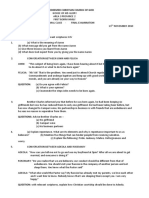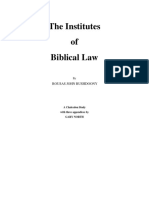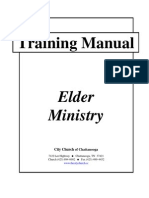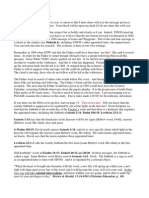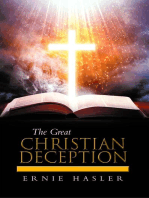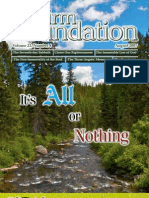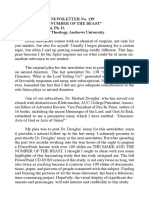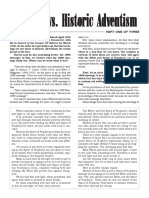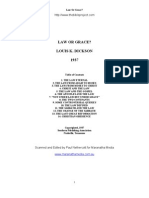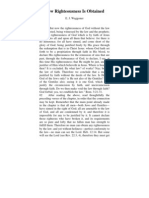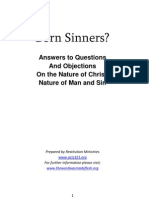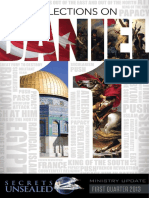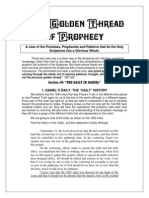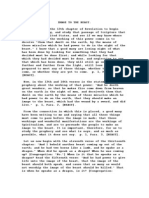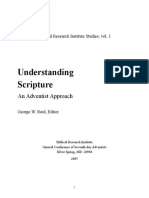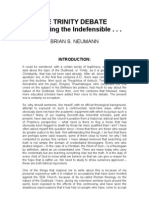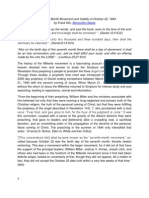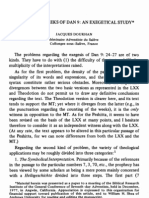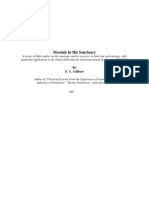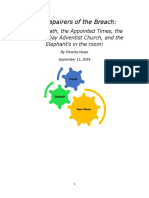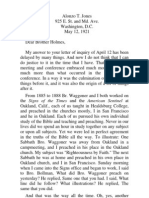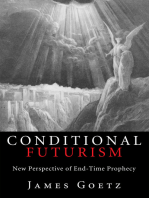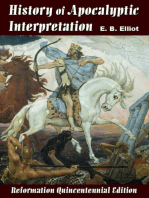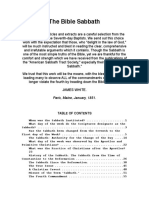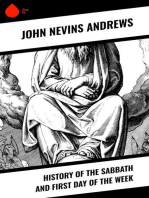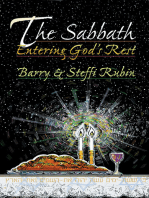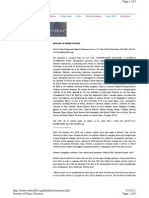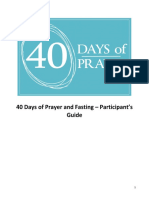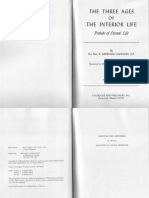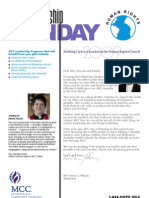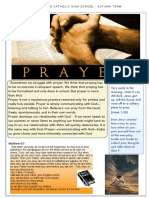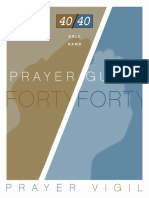Review and Herald 1850. Vol 1. No.1
Review and Herald 1850. Vol 1. No.1
Uploaded by
Tina SimonCopyright:
Available Formats
Review and Herald 1850. Vol 1. No.1
Review and Herald 1850. Vol 1. No.1
Uploaded by
Tina SimonOriginal Description:
Copyright
Available Formats
Share this document
Did you find this document useful?
Is this content inappropriate?
Copyright:
Available Formats
Review and Herald 1850. Vol 1. No.1
Review and Herald 1850. Vol 1. No.1
Uploaded by
Tina SimonCopyright:
Available Formats
SECOND ADVENT REVIEW,
AND SABBATH HERALD.
'4 HEDY. IN THE PATIENCE Of' THE SAINTS ;. IIEVE AHE TttEt THAT
SEEP THE COMMANDMENTS OF GOD AND THE FAITH OF JESUS."
Vot
1.
PARIS, ME., NOVEMBER, iS50,
JOSEPH 11A.TEs,4; S. W. IttIOIAS, J. N,
ANDREWS, and
JAMES WHITE Publishing Committee,
No.. 1.
ito pass, that there went out .some of the people on the seventh
'day to gather, and they found none. And the Lord said unto
Moses, how long refuse ye to keep my commandments and my
laws ? See, for that the Lord bath given you the Sabbath, thereERMSGratis, e%cept the reader desires to aid in its piddicatiort,
All communications, orders, and remitta tees, for the Review and Herald, fore he giveth you, on the sixth day, the bread of two days."-vbould he addressed to JAME g \Vim E Paris, Me., (Post paid.)
The rebuke, how long refuse ye to keep my commandments and
my laws ? implies the previous appointment of the Sabbath and
the positive assertion, the Lord hath given you the Sabbath,
When was the Sabbath Instituted?
ought to settle the question in any mind disposed to understand
Some have contended that the Sabbath was not institutteil un- the sacred historian.
til the law was given to loses at Mount Sinai, But there are
serious difficulties in the way of this belief, In the second chapWhat day of the week do the Scriptures designate as the
ter of Genesis, after having given an account of' the creation,
Sabbath ?
the sacred historian says : " On the seventh day God ended
his work which he had made : and he rested on the seventh day
To this question, it might be supposed that every person who
from all his work which he had made. And God blessed the has any acquaintance with the subject would readily reply
seventh day and sanctified it; because that in it he had rested The seventh. We are aware, however, that efforts are made to
from all his work which God created and made." .Now, if any render this a difficult point to determine. We shall, therefore,
part of tins narrative is to be construed literally, the whole of it make a few remarks upon it,
must be ; and if we may not venture to deny or explain away
It is plainly' recorded that the Creator, after laboring the first
the account which Moses has given of the creation, then we six days, in which he completed the work of creation, rested the
may not deny or explain away this unequivocal statement res- following day, which was the seventh in the order of creation.
pecting the original institution of the Sabbath in Paradise. The This particular day God therefore sanctified and blessed. " And
blessing and sanctifying of the seventh day is mentioned in con- God blessed the seventh clay.' When the law was given at
nection with the first seventh day in the order of time, and it is Mount Sinai, the observance of the seventh day was commandso mentioned as most forcibly to impress the reader that the ed ; and the manner in which the fourth commandment is exSabbath was then instituted. God's resting on the day is given pressed, shows beyond a doubt, that one particular and definite
as the reason for its sanctification ; and it cannot he supposed that day was known to Israel by this name. Consequently, they
this reason existed two thousand five hundred years before the needed no instruction as to what day was intended. This is obinstitution. We conclude, therefore, that the Sabbath was en- servable in Ex. xvi, 22, where the sixth and seventh days of
joined immediately after the close of the work of creation.
the week are mentioned by their ordinal names, as a subject
This opinion is corroborated by some facts recorded in the, with which the people were familiarly acquainted. In this place,
Scriptures. There are frequent and, early notices of reckoning also, the seventh day is declared to be the Sabbath. There can
by sevens. Noah observed a period of seven days in sending be no reasonable doubt but that the day which in the time of
the raven and dove from the ark ; the term week is used in the Moses was knoWn as the seventh day, was the same in its weekcontract between Jacob and Lahan ; Joseph mourned seven days ly succession with that which is called the seventh day in Gen.
for his father ; and Job and his friendS observed the term of ii, 3. If the seventh day nientioned in the fourth commandment
was not the same day of the week mentioned in Gen. ii, 3, as
seven days.
Nor is it in the sacred volume or among the Jews alone that sonic profess to think, it must be perfectly inexplicable, that no
such facts are found. Nearly all the nations of antiquity were intimation is given in the history of those events that another
acquainted with the weekly division of time. The Assyrians, seventh day was intended in the fourth commandment than the
Egyptians, Indians, Arabians, and, in a word, all the nations of one mentioned in the institution of the Sabbath, especially since
the East, have in all ages made use of a week of seven days. both are recorded in the same appellation in a direct series of
And We find that these nations not only divided time thus, but events. But what removes all obscurity from the subject is,
that they regarded as holy the very day which had been sancti- that God has positively declared that the day which he commanfied as a Sabbath although they had, forsaken the true worship ded to be observed in Ex. xx, is the same on which he rested at
and Calliniachus, say, "The seventh the close of the creation. " Remember the Sabbath day to keep
,
of God. Homer,Hesiod,
day is holy." Them/Wag of Antioch says, respecting the seventh it holy." " The seventh day is the Sabbath of the Lord thy
day, " The day which all mankind celebrate." Josephus asserts God." " For in six days the Lord made heaven and earth, the
that, " no city of Greeks or barbarians can be found, which does sea and all that in them is, and rested on the seventh day :
not acknowledge a seventh day's rest from labor." And Philo wherefore the Lord blessed the Sabbath day and hallowed it."
says, that " the Sabbath was a festival not peculiar to any one This language is definite ; and while it assures us that the day
people or country, but so common to all mankind, that it might here commanded to be observed is the same in its weekly rebe called a publio and general feast of the nativity of the world." turns with the day on which God rested, it assures us against
These authors, who lived in different ages and were of different any derangement of the week, or loss of time which might have
nations, cannot be supposed to have written thus in order to been produced in the long lapse of time from the creation, by
please the Jews, who were generally despised and persecuted; the general apostacy from the true worship of God. Had the
and this universal reverence for the seventh day cannot be ac- true Sabbath been lost, it was certainly restored ; and the day
counted for upon any other supposition than that the Sabbath then known as the seventh day received the divine sanction. The
was instituted at the close of creation, and handed down by tra- same remark is applicable to the subject during the succeeding history of the Jewish nation. Had the weekly Sabbath faldition to all the descendants of Adam.
If additional proof of this early institution of the Sabbath is len into total neglect, and the day of its regular recurrence been
needed, it may be drawn from the manner in which it was revi- forgotten, our Lord Jesus Christ, by giving his divine example
ved in the wilderness. Before the children of Israel came to in favor of the day known by the Jewish nation as the proper
Mount Sinai we find' them voluntarily making provision for the seventh day of the decalogue, has settled the question concluSabbath, by gathering on the sixth day a double portion of man- sively, down to that time : so that the day known in the New
na. " And all the rulers came and told Moses. And he said Testament as the Sabbath, was the seventh day in regular sucunto them, this is that which the Lord hath said : to-morrow is cession from the creation of the world. A perfect -uniformity
the rest of the holy Sabbath unto the Lord." " And it came, lamong all the nations in the known world, as to the days of the
G. L. MELLEN
CO,, Printers.
THE REVIEW AND
HERALD.
week, both before and since the advent of Christ, is a further 'by " Lord's day," (Rev. i, 10,) the first day of the week was
testimony, that no derangement of the clays of the week has ever intended.
As these are the chief arguments advanced in support of the
taken place. Indeed, it will not be pretended that the account
of time has been lost since the introduction of Christianity. change, they should be fairly considered, and compared with
Since that period, the Jews as a people have maintained a per- the Word of God. " To the law and the testimony ; if they
fect uniformity in the observance of the ancient Sabbath, though speak not according to this word, it is because there is no light
scattered through every nation of the globe ; and the Christian 'in them." Let us examine them separately.
1. Did the prophets predict a change of the Sabbath'?The
church, in all its divisions, has been knownto observe either the
seventh or the first day of the week ; and for a considerable first and principal text cited in proof of this is Psalm cxviii, 24
length of time, both of these days. So that we are as certain " The stone which the builders refused is become the headstone
that the day now known as the seventh day of the week, is the of the corner. This is the Lord's doing ; it is marvelous in our
same with that enjoined in the fourth commandment, as we are eves. This is the day which the Lord hath made ; we will roof any fact, for the knowledge of which we arc dependent on joice and be glad in it." In order to make any use of this text,
the main points in the argument are assumed. First, it is assuthe testimony of mankind.
med, that Christ's becoming the head of the corner refers to the
In this connection, we would remark-, - that the sabbatical law
day of his resurrection ; whereas there is no conclusive evidence
seventh
clay.
It
is
but
a
the
seventh
day,
but
does not appoint a
flimsy subterfuge to pretend that the fourth commandment en- that it refers to this rather than to the day of his birth, or of his
joins only a seventh part of our time to be kept holy. The peo- entrance on his public ministry, or of his final ascension into
heaven. Next, it is assumed, that the clay spoken of is a natural
ple of Israel never so understood the law of the Sabbath ; and day of twenty-four hours ; whereas this word is often used to detheir uniform conduct ever since shows that they- understood it
to mean the last day of the week, and that only. It will be -ad- signate an indefinite period of timeparticularly the gospel era
mitted, that had the Jews, in the clays of Moses, profaned the (John viii, 56)and is very probably so used here. Again, it
rest of the seventh day, under the pretext that they had rested is assumed, that the day mentioned is the first clay of the week ;
on one of the preceding six days, they would have paid dearly whereas there is nothing which designates this rather than any
for their presumption. If, then, their sense of this precept was' other, allowing that a natural day is referred to. Of course no
correct, no person in any age has a right to understand it in a' confidence ought to be placed in conclusions drawn from such
different sense, for a law cannot have a contrary or a double premises.
Reference is sometimes made to Isaiah xi, 10. " In that day
meaning. While the teepis of that precept remain the same, its
meaning must continue the same. It is true that the law which there shall be a root of Jesse, which shall stand for an ensign of
enjoins the observance of the last day of every seven, does as a the people ; to it shall the Gentiles seek ; and his rest shall be
consequence enjoin the seventh part of our time ; but it is still glorious." This " rest " is referred to the Sabbath, and the exthe seventh day in its proper order that it requires, and not mere- pression " in that day " is supposed to show that it was to be
ly a seventh part. And it should be remembered, that Christ changed by Christ. But whoever reads the following verses
bath said, " not one jet or tittle shall in any wise pass from the will sec that the rest here spoken of is not the Sabbath, but that
law ;" and that the most awful penalty is denounced on him who season when the Lord shall have " set up an ensign for the nadares to explain away its proper meaning. It is obvious, also, tions, and assembled the outcasts of Israel, and gathered togeththat if a seventh day, or any one day after six of labor, be all er the dispersed of Judah from the four corners of the earth."
that is required by the law of the Sabbath, the seventh or last Such a rest may well be called " glorious."
There is one prophetic allusion, however, which some have,
must still be that clay, from the fact, that to change it without
divine authority would be to change the length of the week, and not without reason, referred to the change of the Sabbath. This
violate God's established order. And as in the first instance it is found in Daniel vii, 25, where in describing the papal antiwould be sin, time would never change the character of that act. christ, the prophet says, " he shall wear out the saints of the
A wrong never will become a right by our persisting in it. As Most High, and think to change times and laws : and they shall
it could not be changed without sin, so the sin must ever remain be given into his hand, until a time and times and the dividing
until repented of and retracted. It should be remembered, like- of time." The "times and laws" hero referred to cannot be
wise, that by an admission that a seventh day or a seventh part those of the Mosaic ritual, since they were abolished at the death
of our time only is required, all argument for a change is effect- of Christ, and it could be no sin to suppress them. But if we
ually silenced ; for if any good reason existed for one day more allow that the decalogue, with its laws and time of rest, was to
Continue by divine authority, we are compelled to consider this
than another, the mere seventh part must be abandoned.
as an allusion to the Sabbath and the moral code with which it
is connected. And the history of the change of the Sabbath, toBias the Sabbath been changed from the Seventh to the First gether with the idolatries and sins of the papal church, show
how literally this prophecy has been fulfilled.
day of the Week ?
2. Is it necessary to change the Sabbath in order to commemThis question involves matters of such importance that it should orate the completion of the work of redemption ?
It is said tine
not be answered without a candid and thorough examination. work of redemption is greater than that of creation ; hence the
If the Sabbath has been transferred from, the seventh to the first necessity for a change of the day of the Sabbath. In reply to
day of the week, it must be great impiety to neglect that day or this we remark, the Scriptures are entirely silent respecting the
to appropriate any part of it to secular purposes. If, on the oth- comparative greatness of the two works; and while they give us
er hand, the law requiring the sanctification of the seventh day
no information on this point, we are not warranted in making
of the week remains in force, then to neglect that day is an act
our own suppositions the ground of practice, to the neglect of a
of equal impiety, and exposes the offender to the most awful
positiveinjunction. But supposing the work of redemption to
consequences. The Scriptures should contain the account of it,
be greater than that of creation, is it therefore necessary to celIf the Sabbath has been changed by divine authority. And as
ebrate it on a different day ? Both these works were conceived
the precept requiring the observance of the seventh day is plain
by the same mind and wrought out by the same hand. And
and positive, nothing less than this should satisfy an inquirer in
since
God has seen fit to make the seventh day a time to comregard to the claims of the first day.
memorate the completion of his creative work, why not gather
The method commonly pursued by the advocates for a change together all his merciful works for us, and celebrate them on
of the Sabbath, is to impress their readers, 1. That the Jewish one and the same day ? The greatness of redemption, thereprOphets predicted, such a change ; 2. That there was a neces- fore, instead of being a reason for a change, is a reason, why
sity for the change in order to commemorate the completion of the Sabbath as originally given should be doubly dear to us.
the work of redemption, which was finished by the resurrection
Again, supposing that a change of the day is required in orof Christ ; * * * 4. That on this day of the week Christ der to celebrate the completion of the work of redemption, what
freqently. met with his disciples after the resurrection ; 5. That
day shall be chosen as most appropriate ? Shall it be the day
from that time the Apostles and primitive Christians religiously of the crucifixion, or of the resurrection, or of the ascension ?
observed the. first day in memory of this event, and as a substi- If the time of Christ's greatest display of love for mankind and
tute for the Sabbath ; 6. That the day of Pentecost, when the
his greatest labor for them should be selected, then we should
Holy Spirit descended, was the first day of the week ; 7. Thai
celebrate the day of his crucifixion. This is the day on which,
THE REVIEW AND HERALD.
(if on any particular day,) the work of redemption may proper- thing which gives to the meeting a religious character, or indily be said to have been completed, according to the testimony cates regard for the day. But it is by no means certain that
of the Savior himself, who said on the cross, "/t is finished." the expression " after eight days" means just a week. Who
This is the day and the event in which the Apostle Paul emincan say that it was not on the ninth day after his first appearently gloried ; and it was to the passion of Christ that he con- ance ?
stantly directed the minds of his brethren as the ground of hope
Other appearances of the Saviour are recorded, which no one
and source of encouragement. But if we would have the dray- will claim as having occurred on the first day. Ile appeared
of Christ's highest exaltation to he the day for celebrating the to the disciples when they were fishing at the sea of Tiberias,
completion of his work, then certainly we must fix upon the day (John xxi, 13,) and was seen of them forty days before his asof his ascension, rather than of his resurrection. The Scriptures Icension, (Nets i, 3.) Now, if the appearance of Christ on the
say it was " when he ascended on high " that " he led captivity first day proves it to be the Sabbath, then his appearances on
captive, and gave gifts unto men." Dam it was that " all pow- other days prove them to be Sabbaths, since as important busier " was given to him " in heaven and in earth." Then it was ness was transacted, and as much mention made of the Sabbath,
that God " highly exalted him, and gave him a name which is in one case as in the others. And if this be allowed, then we have
above every name, that at the name .of Jesus every knee should the example of Christ and the Apostles for traveling, fishing, or
bow." If then, a day were to be selected as a weekly Sabbath, doing tidy other business on the Sabbath. To such results would
which was " validly the day of redemption," it seems most pro- consistency- drive us in applying the principle that example, withper to select the day of Christ's death, which was the end of his out precept, is In regulate our practice. But the claims of the
temptation and conflict with the powers of darkness, and the se- seventh day rest upon no such authority. God enjoined it, and
verest test of his obedience ; or the day of his final ascension. then added to the precept his own example of resting upon it.
These things are not said to prove that any sanction is given to No argument, therefore, drawn from example without precept
those days above others, since only a divine institution will weigh can justly weigh against it.
with us ; but to show the absurdities into which they are led who'
5. Regard (f the Apostles for the ,first day.Another argupretend to honor the resurrection while neglecting the law of ment for the change of the Sabbath, is the supposed apostolic
God.
practice of meeting on the first clay of the week for public worIt is evident from such considerations as these, that the rap.' ship and the breaking of bread. It is often confidently affirmed
ment for a change of the Sabbath from its necessity to commemo- that the keeping of the first day instead of the seventh is sancrate the work of redemption, is not supported by reason or Scrip: tioned by Apostolic usage. The proof of this position rests
tore. It rests alone upon man's authority, and acknowledges a; mainly on two passages. Let us examine them.
principle which would justify all the innovations and extravaThe first is Acts xx, 7. "And upon the first day of the week,
gances of Popery.
when the disciples came together to break bread, Paul preached
4. Christ's meeting with the disciples after the resurrection,-1 unto them, ready to depart On the morrow, and continued his
It is common for the advocates of a change of the Sabbath tol speech until midnight." But is there any thing in this transaclay great stress upon Christ's meeting with his disciples, after! tion, or the attendant circumstances, which clearly and undenihis resurrection, on the first day of the week. We will exam-1 ably proves an apostolic example in favor of a new Sabbath, or
ine these different appearances, and sec if they afford any proof of keeping the first day of the week,. in any manner, as a subof the change they are brought to show.
stitute for the former institution ? Surely there is not. The
On the day he was first seen after the resurrection, Christ tip- 1, passage does not so much its prove that the practice of meeting
peared three times to different persons and at different places.; for worship on the first day of the week was then common and
His first appearance was to Mary, while she was alone at the' general. But if it did, it would not determine the change consepulchre, John xx, 16. There is nothing, however, in the cir- tended fur. There is nothing said in the narrative which charcumstances connected with this meeting which indicate that the acterizes the clay of this meeting as a Sabbath. Assembling for
least sacredness is to be attached to the time when it occurred. public worship is proper on any clay of the week, and so is the
His second appearance was to two of his disciples as they jour- breaking of bread. The supper was first administered on one
neyed to Emmaus, Luke xxiv, 13-35. He accompanied them of the six working days ; and there is nothing in the Scriptures
to that place, and both they and he returned to Jerusalem the which restricts its subsequent ndministratien to a parlicular day
same day, making a distance of about fifteen miles. There is not even the authorized Sabbath. Besides, in this case, the
no indication that this journey was undertaken for religious pur- breaking of bread was deferred until after ni idnight. Of course,
poses : and as our Lord did not rebuke the disciples, or instruct according to the Jewish reckoning of time, it was attended actuthem to do differently in future, it is reasonable to suppose .he ally on the second day ; and this must have been the case, also,
approved of their traveling on that day. Of course, then, this according to the prevailing custom among observers of the first
circumstance, instead of indicating a regard for the first day, day, of commencing the day at midnight. It seems, therefore,
gives us the example of Christ and the Apostles for traveling that the Apostle and his brethren were not very precise in reupon it.His third appearance was in the evening of the same gard to its being done on the first day. Let the most be made
day, when the disciples were together, probably at their own of this passage, and it lacks a divine designation of the first day
house ; for we find the eleven not long after this occupying a as the Christian Sabbath; and hence it is entirely wanting as to
chamber in Jerusalem. (Compare John xx, 10 with Acts i, 13.) the requisite evidence of a change in the sobbatic law. Surely,
There is not the least intimation here that the disciples have if there had been such a change, and this, with one more inbeen during the day, or were now, together for worship. On stance of meeting on the first day of the week, were to contain
the contrary, the absence of Thomas affords presumptive evi- the evidence for all after generations, we should have been indence that this was not a meeting generally agreed upon. And famed of the fad- . .Something would have been said to deterthe fact that most of them were not satisfied that Jesus had risen, mine that the first day of the week was regarded as a Sabbath, and
shows the impropriety of representing this meeting as proof of a that it had taken the place of the seventh. But there is nothing
regard for the day on account of the resurrection. It was im- of this. The record is perfectly silent in regard to either point.
portant that the earliest information of the resurrection should Besides, it is evident that the original Sabbath continued to be
observed throughout the entire period of New Testament history.
be afforded for the consolation of the desponding disciples, and
This is so plain a fact, that no one who gives the subject a can
for a testimony to the truth of the Saviour's prediction, that he
did examination will deny it. This shows the opinion of a new
would rise after three days ; and there is nothing in these sevSabbathobserved, as it must have been, in connection with
eral appearances which seems intended for any other purpose.
the Sabbath of the fourth commandment, and without a word
The next and only other meeting of Christ with his disciples,
being said on the subject, or the least objection, stir, query, or
which is held to have been on the first day of the week, is menexcitement whatever being raisedto be perfectly-preposterous.
tioned in John xx, 26" And after eight days again his disciSuch is the result of this reasoning from a supposed apostolic
ples were within and Thomas with them." Now had this inexample, giving the passage its widest possible scope, as implyterview been on the following first day it could afford no strength
ing a common practice of meeting for public worship on the firs
to its claim for religious regard, since it is not noticed as a meetday of the week. But in reality there is nothing in this tex
ing designed for worship. Mark, (ch. xvi, 14,) in noticing one
which proves or implies that such a practice was common a
appearance of Christ, says, " He appeared unto the eleven as that period. For aught appears, it might have been an oceathey were at meat," i. e. eating a common meal. There is no-
THE RE VIEW ANI) I E RALD.
sional meeting, appoi n ted merely in consequence of Paul's be-Jestament history, it would be perfectly natural for John to
ing about to depart on the morrow. Therefore, to adopt a prat- 1 "speak of it as " the Lord's day." Further, there is no evidence
'tire se important as the one in question, upon such vague, un- ',that the first day of the week was denominated the Lord's day,
,certain, and inadequate testimonyespecially when, in order -,tt so early a period, Only one writer mentions the expression
'thereto, we must dispose of a plain and positive command of Lill towards the close of the second century ; and the reputed
( which
'Clod respecting the observance of the seventh day, and of aHauthor of this passage, when speaking, in Lim ( 44spel,
usage as old as the completion of the creationis unreasonable was written some years later than the Apocalypse,) of the res
Urreetion of Christ, and the first day of the week, never intimates
in the extreme.
Another passage quoted in proof of an apostolic example of ,that the day should be called by any other name. The learned
keeping the first day of the week, and, consequently, in support': Moyer, though an advocate for the first day, in mentioning the
different days to which this phrase may be applied, acknowlof the opinion that the Sabbath is changed, is 1 Cor. xvi,
" Upon the first day of the week let every one of you lay by him in edges the entire uncertainty as to what day is intended, and
store, as God hath prospered him, that there be no gatherings; says, " It is very likely that the more solemn and public use of
when I come." This passage, like the others, does not imply', the words was not observed until about the time of Sylvester II.,
that the first day was then commonly and generally regarded as when, by Constantine's command, it became an injunction." It
a day for public worship. Indeed, it does not necessarily imply! is evident, therefore, that this passage cannot justly be used as
a public meeting of any kind. The direction fin- every one to' proof that the Sabbath was transferred to the first day of the
lay by him in store," for the }repeat of the poor saints at Jerusa- week.
We have now examined the texts commonly adduced to prove
lem, " on the first day of the week," necessarily amounts to no
more than an appointment of this day to make up their bounty a change of the original Sabbath, and have ibund them utterly
at home, so that it might be sure to be ready when the Apostle insufficient and deceptive. Hence the claims of the Sabbath of
should come. But if it be understood to imply any thing more, the fourth commandment, without alteration, are fully sustained.
it is simply that they should bring their donations together pub- The advocates for the first clay arc aware that if an abrogation
licly on the first day of tire neck, so as to be prepared in the or change of the original Sabbath law cannot be made out, the
fullest manner for the Apostle', visit. Therefore, according to seventh clay is still the true Sabbath. Dr. Dwight, for instat!c;e,
this view of the case, it proves no more tlliiin an occasional meet- makes the following admission : " Tf we cannot rind in the Scriping on this day for the purpose of a public contribution for an tures plain anal ample !roof of the abrogation of the original
important object of benevolence. But even if it could be so con- day, or the sub.ztitution of a new one, the seventh day undoubtstrued as clearly to imply that it was then a common and general ediv remains in full force and obligation, and is now to be celepractice to meet for public worship an d instruction on this driy, it brated by all tire race of Adana" [From Sab,
would not thereby be pointed out to us as the
C;abbatli,
and a substitute for the seventh day, seeilig that it contains no inTILE SABBATH :
formation to that effect, and that no divine warrant appears on any
AUTHORITY FOR THE CHANGE OF TI1E DAY.
was
part of the New Testament records for the supposed change.-It being clear from the Scriptures, that the seventh day
Meetings for public worship, taking up of collections, and even instituted by divine authority for a weekly Sabbath, and religbreaking of bread, do not constitute a Sabbath. To sabbatizx is iously regarded throughout the times of the Old Testament, those
to rest from our own secular labors, and keep a season to God. who now relinquish its observance, and keep the first day of the
These proofs for a change of the Sabbath, therefore, which arc week, take the ground that the Sabbath was either abrogated
unquestionably the best that can be produced, arc utterly def
t- null' a new institution introduced in its room, or that the time of
cient, and the argument therefrom, as f;enerally presented, is its observance was changed from the seventh to the first day of
deceptive, and unworthy of confidence.
the week, in commemoration of the resurrection of our Lord
6. Descent of the Holy Spirit on the day of Pentecost.Much Jestis Christ. To be consistent with themselves, therefore, they
has been said respecting the descent of the Holy Spirit, on the are bound to evince one or the other of these positions. The
day of Pentecost. It is urged that this was the first day of the burden of proof evidently lies on their part. For unless it can
week, and that this circumstance was air intimation that God de- be shown, that the fourth commandment, which requires the
signed to bestow upon the day in its weekly returns a special sanctification of the seventh day, has been abolished, or amendhonor, This opinion, however, is supported only by assumption. eel by the substitution of the first for the seventh day of the. week,
The clay on which that remarkable event occurred, is known it is clear that the original appointment remains obligatory and
enly as the day of Pentecost, an annual feast of the Jews, fifty- is now binding on the entire human family. And to substantidays from the feast of the Passover, which was held on the four- ale either of these points, the proof must be clear and decisive.
'teenth day of the first month. It might, therefore, occur on the It will not do to rest upon doubtful deductions. We have an unfirst, or any other day of the week. This year it probably came questionable right to demand that divine warrant, in either case,
on the fifth or seventh day. But the fallacy of the argument we which pertained to the institution as originally delivered.
here oppose, is apparent from the' fact, that it is founded in the
We will therefore first examine the proofs adduced in favor of
presumption that they began to count the fifty days from the the abrogation of the weekly Sabbath and the introduction of a
morrow after the weekly Sabbath, whereas they counted from new institution.
the annual passover Sabbath. See Lev. xxiii. The descent of
To sustain this position, the broad ground is taken by some,
the Holy Spirit at this time could not be considered as rendering that the Decalogue itself, in which the law of the Sabbath is confamous any other day than the Jews' feast of Pentecost. But tamed, was abrogated ; and that, under the new dispensation,
we have no evidence that God. intended by the event to bestow, no part of it was binding but what is newly enjoined or expressa. special honor upon any day. It was the fulfillment of an im- I/ recognized, either by Christ or his Apostles.
portant promise that the disciples should be baptized with the
The perpetual obligation of the Decalogue implies, of course,
Holy Ghost.
the perpetual obligation of the Sabbath as enjoined in the fourth
7. "Lord's Day."An argument for the change of the Sab- commandment. But if that
was abrogated, the Sabbath which
bath is founded on the supposed application of the title " Lord's it enjoined was also abrogated ; and, consequently, it ceases to
day," to the first day of the week. The only passage referred be binding, unless renewed under the new economy. What,
to for the purpose of sustaining it, is Rev, i, 10. " I was in the then, is the proof here relied upon ? One of the principal passpirit on the Lord's day." But that the day here 'called the sages in which this proof is supposed to be contained is 2 Cor.
Lord's day, is the first day of the week, is merely assumed, and iii, 7, 8, 13. " But if the ministration of death, written and enhence is not to be considered as proved. It is not in fact prob- graven on stories', was glorious, So that the children of Israel
able that this is the day referred to. * * * If these words could not steadily behold the face of Moses for the glory of his
be understood to refer to a -natural day, it is more likely to be countenance, which glory was to be done away, how shall not
the seventh day, which God had blessed and sanctified for his the ministration of the Spirit be rather glorious ? . . . And not
special service, than the first day.. The seventh day is called as Moses, which put a veil over his face, that the children of Isby Him " my holy day," and " the holy of the Lord"phrases
rael could not steadfastly look to the end of that which is abolvery similar to the one in this passage. This was also the Sab- ished," It is argued from this passage, that the clauses " which
bath which was made for man, and of -which Christ says he is glory was to be done away," and " to the end of that which is
Lord. And since it was observed up to the close of the New abolished," refer to the whole law, moral as well as ritual, be-
THE R.I.:N[1.n\ AND IIENA1,1 1.
,.se mention is made of " that NI hick was written and engraven ,verse, viz : " Let no one therefore judge you in meat, or in drink,in stones," which is an evident allusion to the Decalogue. but, of in a part or division of a festival, or of a new 100011, or of sabot' CalTI.111 eX1110111/1.1100, it Will be r0111111 r11:11 " that 1,111.1011 WRS to bat-6." The
sabbaths alluded to are obviously- those which arc;
!,c, dime away," was not the, Decalugur ilgrlf, but " the ministra. j round in the same place with meats and drinks, festivals and
ion of it," which was thou tlipoiluedthe slime being emblem- 'new moons, and which were of the same generd clutraeter.
a.icailv illustrated by the glory- of Moses' countenance, which
weekly Sabbath, therefore, is not affected at all by their shwasmerely nanporary. This clause refers expressly to the, glo- ,rogation, but remiiins in full force, as does every other precept
ry of his eouliteMitnee, and not to the glory or the law itself.-- 'or the Decalogue.
So also the clause "that? which is abolished," does not refer to
We find the same distinction as to the law whif-h. was abolthe Decalogne, but to the ministration of Moses, including the :ished, in Epfa!sms ii, 14, 15. " For he is our peace, who bath
appended rights and usages, the priesthood and its sacrifices, made both one, and Math broken down the middle wall of partiwinch Were useful merely for the nine being, It cannot be sop- jtion between us, having abolished in his flesh the enmity
-, even
posed that. the Decalogue WaS abolished, without ex pressly con- the taw of commandments contained in ordinances, for to make
tradteting Christ's testimony, Abut. v, 17.19, as well as by ma- l in himself of twain one new man, so making peace." f fere the
ny other representations of the Scriptures. The abolishment middle wall of partition between Jews and Gentiles, called " the
spoken of, therefore, evidently respected no other than Melt the !enmity," is expressly defined, as berOl'e, to be "the law or comApostle calls in another place " the law of commandments con- tuandments contained in ordinances." This, and this only, theremined in ordiminees," inclusive of the entire ministration of Mo. . fore, was abolished, leaving the Decalogue, or moral law, in its
ses. There is unquestionably a reference in this chapter to the original character and obligation. 'Phis is the hinguage of the
Decalognc, hut not as abolished. It WaS merely the ministra- whole Bible, There is no proof in any of these passages, that
thin of it, or the then instituted manner of teaching, iilastrating, ithe lay.' of the tell commandments Was abolished, or that the
teal enforcing it, which was abolished, to he succeeded by a new .Sabbath enjoined therein was done away.
ministration of the same law by the Spirit. For it i., written," I
Nor is there such proof in loinans xiv, 5, 6. " One man eswill put my law "(the very law of tlee ten commandments)_ teemeth one day above another; another esteemeth every day
" in their inward part', and Write it in their hearts." Again, alike. Let every man be fully persuaded in his own mind. He
" We are not without law to (ICA, but under the law to Christ." that regarded' the day, regardeth it to the Lord ; and he that re-NVhat law but the Decalogne is herev referred to ? Evidently gardeth not the day, to the Lord he cloth not regard it. lie that
110)11'. For surely we are not under thin Mosaic ritual. Again, eateth, eateth to the Lord. for he giyeth God thanks: and ho
" 1)o we make void the LAW through faith ? . . . Yea, we estab- tled eateth not, to the Lord he eateth not, and giveth Cod thanks."
lisle th e la w." The same, no doub!, which Was contained in tile 1TiliS passage is frequently adduced as proofthat the obligation
Deredegue. I fence, the Apostle James says, If ye fulfil the to keep the ancient Sabbath has ceased, and that under the Guslaw according to the Scripture, Thou shalt love thy neighbor as pal dispensation there is no divinely authorized distinction in the
thyself, ye shall do well." 1 fore the title " the royal law," is days of the week ; that there is no one constituted holy in disgk en by way O.r eill.nenee to the DeCaloglie ; and its permanent tinction from the rest ; and consequently that every one is left
obligation is manifestly recognized ; for the precept alluded to at his own. liberty to keep a Sabbath or not. It will be easilya summary Or the last six 0(1010mnd/110/its of this code, and the perceived, that if' this a rumeent has any weight in reference to
it operates equally against the
allusion is so made its to imply the continued obligation of the the srrenii, day as the Sabbath,
first lour, which are summed up in supreme love to (hod. A (fain, obligation to keep the first clay, either as a substitute for the scythe Apostle John u,stilles; " 1 Foreby do we know that we ;know enth, or as a memorial of the resurrection, seeing it places all
distinctions whatever as to days on the same ground with the
him, if we keep his commandments." And again, "
are they that do his conunandments, that they time have right to eon fessedly obsolete rites of the Mosaic ritual. According to
the tree or life, 1111d 'nay enter through the gates in the city." In this view of the passage, we have under the Gospel dispensation
Hill these passage's reference is evidently had to the precepts o, nn Sabbath at ailnot so much as an cell)/corked memorial of
he I )0ealogm, as the essential and permanent ride of obedience the resurrection. Ile who claims the least authority for the obfor 'hristians. The do n!! :may or abolishment, therefore, -"Tholien servanee of the first day of the week for anc piirpose, takes a
of in du, above passage, ca moot ref{ r to the n eea l egn e or the course which completely overthrows the argument based upon
this passage. But, in reality, this text has nothing more to do
moral law itscl !nit to the Mosaic dispensation or ritual.
.k wither or the proof, Idledpql fur the abrontion of the Dec- 'with the subject before us, than either of those wtiich have been
'cNaltlilled. It respects merely the distinctions which formerly
alo:me, and c onsequently of the sa hkoh,
existed in regard to the six workinu days of the weeksome f
ti. " Blotting out the hand-writing of ordinances that was a ,,ainst
took
it
ant
of
the
\env,
nailior
them
being appointed in the Mosaic ritual as sabbaths, edicts as
114'11
\ins
10111n11'1"
to
0:4,111111
us, m
la's or atonomeut and lifirifleanon, and others as festivals. Some
yin_; sus:find
i t to the eras:;un
and
Let of the early Christians dame-lit these distinctions still binding, as
over then) in il.
0111111' 11 1.4100 of tbeli1
and drinks; others thought
oh,
or
in
respect
of also the distinctions in regard to
flri
e,nall therefore juilue you in meat, or in
No holy (1:1\-, or of the pe w 'neon, or of the sabhath days, which they were nut. _Hence the exhortation which is subjoined to
'named Corbett -ranee. Tied the distinctions referred to as to days,
;ire a sleehey of things to come ; bat the both is of Christ."
et' orlinances," is innst evidently meant were those noted in the Mosaic ritual, and did no't include the
Ily " the
the ceremonial lawnet the I icealoerite, or the moral law: d one contained in the fourth commandment, is manifest from the
whole scope of the chapter. There is particular reference made
This is 1)(. or characterized ;1'4 t 11C I la A-writing or om Jim
n o e's freely eating all things, while another would eat only
neref ore , the blotting
out," " taking away," and caning to' ,to
'
the cross," spoken ()I', hat e no reference to this law, but to the', herbs; and accordingly the following ruk), to be respectively
Mosaic ritual. This is particularly distinguished from the Dec..Hebsered, is laid demi : " Let not him that eateth, despise him
a l eelic, ;L u ll etly describe') z is "the law of commandments couq that eateth not ; and lei not him that eateth not, judge him
emitted in ordinances," It was this, and this only, which was ,that eateth ; for God bath received him." This quotation clearto the cross." A s, therefo re, the', ly evinces that the Apostle was treating of ritual distinctions,
bt,a ted et a an d
reference made by the Apostle is expressly to this low', it fol.'!,and not of Mat distinction of days tt hich was constituted by the
the Sabbath.
lees, by at fair inference, that "the sabbath days" alluded to,Haneient law of
Again, the abrogation of the Decalogue is supposed to be
or, strictly rendered " sithbflillS," are those which were containItittglit in koauans vii, 4, 5, 6. " Wherefore, my brethren, ye
eel in this law., or ainonu these " ordinances," and do not in
the Sabbath a the fourth vonunantlinent. There were, besides;,also are become dead to the law by the holly of Christ, that ye
the meekly Szibbath, various other sabliaths appointed, 'which:shuttle! be married to another, even to him who is raised from
beloleaal CO that ritual, and not to the Decalogeo. Accordingly,Lthe dead, that we should bring forth feud auto God. For when
,kve were in the flesh, the motions of sin which were by the law,
these here expressly included in " the hand-writing of ordina0.1
did work ill our members, to bring forth fruit unto death. But
shadow
of
things
to
come,"
and
a
cus," and like the rest were "
the law, that being dead 0 herein we
ceased to he obligatory at the death of Christ. There is evi.',now the tire deliVered iront
Ile \\AWNS or spirit, and not. in
dentlY 00 authority ill this passage for inchicling any sabbaths were held ; that ytr should serve ill
but what properly belonged to the Mosaic ritual. This view of the oldness or the letter." not if the term law here includes the
as well as the can-mania/ law. it is manifest tint believers
Ile, matter is cerroborated by at more literal reliderinu of the 17th' nava/
THE REVIEW AND HERALD-
are not said to be delivered from it, considered in any other i Lordthat we should not kill, not commit adultry, nor steal-are newly enjoined or expressly recognized under the present
light than as a covenant of works. Certainly they are not delivered from it as a rule of dedience. To suppose this is inconsis- 1 dispensation, and, consequently, universally binding ; the same is
tent with Christ's sermon on the mount, before alluded to, andll true of the fourth commandment, which requires the keeping of
many other decisive proofs of the perpetual obligation of the 1 the seventh day.
Again; an attempt is made to prove the abrogation of the origDecalogue. It is probable the Apostle had special reference to'
the deliverance of believers from the curse of the moral law. inal Sabbath, by showing that the entire Decalogue was peculiar
This is reasonably inferred from the clause, " that being dead to the Jewish nation, constituting a national covenant, which, at
wherein we were held." If any thing more pertinent to this law the coming of Christ, was annulled, and a new covenant introbe intended, it must be its original character when given to Adam duced. But admitting that it was delivered immediately to them,
as a covenant of works or of life. For surely we are not and in the form of a national covenant, this does not in the least imCannot be delivered from it as a rule of obedience, so long as ply that it was not equally binding, as a rule of obedience, upon
God is what he is, and we are what we are. Seeing that as' other portions of the human 'family. We might as well argue
long as the relation constituted by his character as Supreme Ru- that the New Testament belonged merely to the primitive Chrisler, and by ours as moral subjects, exists, we shall be bound to tians, because it was delivered directly to them, and constituted
love him supremely, and our neighbor as ourselves, which is the the rule of their conduct and the basis of their hopes. Yea, we
fulfilling of this law. And to suppose that this law, as a rule of might as well suppose that no nation except the Jews were bound
obedience, was actually annulled, and that those precepts only not to have any other gods before the Lord, not to kill, not to
are now to be considered obligatory, which are enacted or pub- commit adultry, not to steal, not to bear false witness, as to suplished anew under the Gospel, is to suppose that God, at a cer- pose that the Decalogue was purely of a national character, and
tain time, actually rescinded the rule requiring supreme love to binding merely on that people during their continuance as a nahim, and to our neighbor as ourselves, which is palpably incon- tional church. And, as the Decalogue was not merely national
sistent, and contrary both to the current of Scripture and the na- as a whole, so there was nothing national intlie fourth commandture of things. It would be maintaining that to be changed which ment. It belonged, equally with the other nine, to the entire
is manifestly unchangeable. It would imply that, for the time be- family of man, inasmuch as the essential reasons of all and of
ing, the obligation recognized by the law did not exist ; that the either of the commandments, were of universal obligation.
tie by which God and moral beings are united, was sundered,
Again, that the original Sabbath was peculiar to the Jews, and
not by rebellion on the part of his subjects, but by his own act consequently abrogated by the introduction of the new dispensation, is argued from its being specially urged upon them by the
of abrogation. Can this be admitted ?
But if it were admissible, and if no part of this law is binding consideration of their deliverance from Egypt. But this arguon Christians but what is newly enacted or particularly recogni- ment is of no force, because the same reason is urged in the prezed under the Gospel dispensation, the Sabbath of the fourth face to the entire Decalogue.
commandment could not in this. way be set aside ; because its
For the same purpose, also, an argument is founded upon the
continued obligation is plainly taught in the New Testament. fact that the fourth commandment was enforced with a deadly
It is altogether a mistake, that we have no express recognition penalty. But this argument also fails ; because a similar penalof this precept under the Christian dispensation. It is plainly ty was annexed to the breach of the other precepts of the law.
recognized by the Saviour in Matt. v, 17-19, where he says, The truth of the case is, that these penalties belonged not to the
that he " came not to destroy the law, but-to fulfill ;" that " one Decalogue itself as first promulgated, any more than they belong
jot or tittle shall in no wise pass from the law, till all be fulfill- to it...now under the milder dispensation of the Gospel. They
ed ;" and that " whosoever shall break one of these least com- were added in the Mosaic ritual, and constituted a part of the
mandments, and shall teach men so, stint be called the least in political arrangements for the time being. Their abrogation,
The kingdom of heaven ; but whosoever shall do and teach them, therefore, affects not the original law. Though there be no civil
:shall be called great in the kingdom of heaven." If any com- power now given to the church to enforce obedience to this premandment of this law is binding, the fourth is binding of course, cept by temporal punishments, as formerly, the sacredness and
even if it should be called the least. It is also recognized in the obligation of the institution are not thereby at all affected. The
following declaration of Christ, Mark ii, 27" The Sabbath was sin of disobedience will be visited in God's own time.
made for man, and not man for the Sabbath." The word man
Again, some have inferred the abrogation of the former Sabis here obviously used for the entire racenot for a partnot bath, or at least its change, from our Lord's vindication of the
for the Jews in distinction from the Gentilesnot for those who act of the disciples, in plucking the ears of corn, and rubbing
lived under the Old Testament dispensation, or till the time of them in their hands, as they passed through the corn-fields on
Christ's death ; but for man in his protracted existence during the Sabbath day, and from his saying, that " the Son of Man is
all future periods of time, i. e. for mankind in general. This is Lord also of the Sabbath day," Mark ii, 23-28. But there is
the plain import of the declaration. And if we render the orig- evidently nothing in this narrative, or in this declaration, to jusinal with the article, it is still more evident that the entire race tify such an inference. It must be admitted on all hands, that
is included. " The Sabbath was made for the man," i. e. for the fourth commandment was obligatory, as originally given,
Adam, the original parent of man, including, of course, his pos- till the death of Christ, if no further; and therefore Christ, who
terity. But according to either rendering, the entire human " was made under the law," was bound to obey it in its original
race is manifestly included in the term. The Sabbath, then, strictness. Admitting that he possessed the right, in a given inwas as truly made for the Gentiles as for the Jews ; and for stance, to intermit its obligation, it is not consistent to maintain
those who should live after the crucifixion, as for those who liv- that he did it ; because he came to render perfect and universal
ed before ; which is an explicit recognition of its perpetual ob- obedience. Hence he affirmed that one jot or one tittle should
ligation.
in no wise pass from the law " till all be fulfilled." His whole
The same recognition also appears from its continued observ- life was a perfect comment on the requirements of the law.
ance under the ministry of the Apostles, and there being not the Had he failed in the least particular, he would have been inadleast hint or stir in reference to its abrogation, or to the substi- equate to the great purposes of our salvation. It is obvious, therefore,
tution of another day in its room. The weekly -Sabbath is fre- that the transaction alluded to was not, under the circumstances, a breach
quently mentioned in the Apostolic records, as a part of practi- of the fourth commandment, but in perfect accordance with its prescripcal duty, and it was unquestionably the seventh day. Thus we tionsthe labor implied by the act of the disciples being a matter of urhave the continued obligation of the Sabbath sanctioned by Apos- gent necessity. " It is lawful," said he, " to do well on the Sabbath
tolic example. If, therefore, a riew edition, or an express re- day." Neither does the declaration, that" the Son of Man is Lord also
of the Sabbath day," imply that he abrogated or changed it, but rather
cognition of the Sabbath of the fourth commandment be consid- that he was bound and engaged to protect it as a divine institution, and
ered necessary, to bind the consciences of men under the new to enforce an enlightened and strict obedience to its requirements.
dispensation, the foregoing considerations will show that we have
The foregoing being the principal proofs adduced for the abrogation
such an edition or recognition, as truly as we have of the other of the Decalogue, and the original Sabbath, it is evident that this view
precepts of the Decalogue. So that nothing is gained in regard of the subject cannot be sustained. It is not sanctioned by any plain
to setting aside, the seventh day of the week, by attempting to scriptural evidence. It is, therefore, palpably absurd to rest so imporshow the abrogation of the Decalogue. If those precepts of that tant a matter upon so slender a basis. It is laying violent hands on a
code of moral and immutable precepts, given by God, and promulgated
law which require that we should have no other gods before the under peculiar and terrible signs of purity and majesty, to vindicate
THE REVIEW AND HERALD.
practice which was introduced long after the commencement of the was most cheering to their hearts, particularly to .1, V Mules and S.
Bliss. See Col. 2 of the same page; also the Herald for May 21. Wo
Christian era. [From Sabbath Tract No. 3.
'think that this organization was completed April 5, 1846. in the city of
Rochester, N. Y. See Vows: OF TRUTH, April 22, page 25 - also page
THE REVIEW AND HERALD.
29 Col. 1, "Conference Address :' " Our brethren, east. west, north
:and south, are harmoniously, (with a few exceptions.) united in the faith
. &mails: them thrush thy truth; thy word is truth."
'and hope of the gospel, and well engaged in extending their benign influence and blessings to others, They are making preparations for going
PARIS, NOVEMBER, 1850.
to work the PRESENT SEASON understandingly, and effectually, for thea
SALVATION Of PERISHINi THOUSANDS around theist."
TO OUR READERS.The REVIEW and HERALD is designed to be
The editor of the Voice of Truth was not ready to unite at the first
strictly confined to those important truths that belong to the present conferences; for he, with some others, adhered strenuously to the Cry at
time. We hope to be able to sendyou this enlarged size of the paper Midnight. See his article on this point, in the Voice of Truth for
quite often, containing a simple and clear exposition of those great 11, 1815, and then his decided change in Nov. 11, 1846. Here weJune
see
and sanctifying truths embraced in the message of the third angel, viz : the perfect union with the advent editors and their adherents. Sec the
the " commandments of God and the faith of Jesus." It is truly lamen- view of the Laodicean church by the editor of V. T. Aug. 13, 1845,
table to see Second Advent papers, that once advocated the pure, naked published since in the Advent Review Extra. This shows the decided
and cutting truth, applicable to the time, now devoted to the discussion change and departure from the Philadelphia state of the church, where
of questions foreign from the present truth, which cannot possibly bene- they all professed to besat the tenth day of the seventh month, 1844.
fit the dear saints that are perishing for spiritual food. Among other See the "Advent Review," of 48 pages, published at Auburn, N. Y.,
-charges given to Timothy by the Apostle Paul is the following," But containing their thrilling testimonies.
foolish and unlearned questions avoid, knowing that they do gender
Undoubtedly they were then in the right state of the Mira, and
strifes." This we intend to do. And with much pleasure do we look holding fast that to which they had attained, viz : the change from Babforward to the predicted period, when the sheep, that have been scatter- ylon, or the Sardis state of the church, to the Philadelphia state.
ed on the mountains of Israel since a cry at midnight, -shall be gathered
When they changed from the Philadelphia to the Laodicean state, we
into the unity of the faith, the rubbish blown away, and the precious believe they influenced hundreds of honest souls to go with them.
" jewels " all brought into the clear light of the third angel's message, These are the ones we are trying to seek out, by this article, and every
and in this second " casket " " shine " forth with " ten times their for- other possible way, and show them their perilous and helpless condition,
mer glory."
and utter destruction, if they do not forsake them and turn back immeWe call the special attention of the brethren to the articles, in this diately to the open door in the Philadelphia church ; for there is no
number, from the publications of the Seventh-day Baptists. They are promise, or hope for them where they are. See Rev. iii : 16, 19.
Let us just take a general retrospect of the downward progress of the
clear, comprehensive, and irrefutable. We intend to enrich the columns of the Review and Herald, with extracts from their excellent Laodiceans. For six successive years, viz : from the fall of 1841 to the
spring -and fall =of 1850, the most of these leading members have been
works on the Sabbath.
We also design to get out a large pamphlet, containing the same mat- aiding and assisting each other in changing the chronology, i. e. the
ter from their publications, that we publish in the paper. Such a work, world's history ; to prove that they were on the true position. What
have they gained? Answer, nothing but disappointment and confusion.
judiciously circulated, will certainly do a great amount of good.
This, too, in direct opposition to their standard work.
(Advent Shield.)
How SHALL WE CIRCULATE PUBLICATIONS '!A,3 our list of names is It has not proved to be their shield, that is clear. Six times, did we say
small, we can send them to but few; and it is impossible for Its to give them a yes, snore. Some have moved the time for the termination of the 2300
wide and faithful distribution, unless the brethren situated in different places days, from fall to spring, for six years in succession, and thus they have
help in the work.
almost finished a circle, (if seven years would make one,) instead of
First, they should be sure to send the names of those who would candidly read, gaining one inch the right way.*
and
The Advent. Herald for March 2, 1850, at last came out and proved to
Second, every brother and sister should do all in their power to seek out those
who would read with profit, and obtain suitable publications for them. There is a demonstration that the position of the tenth day of the seventh month,
a large amount of the'. Advent Review," that should be circulated immediately. relative to the end of the 2300 days was right. But, said one of them
Sly brethren, it is time we that were all interested, and zealously engaged in to me ; nothing was accomplished. Daniel was told that the sanctuary
spreading the truth.
should be cleansed ; but nobody knew anything about it, NO, NOT EVEN
We shall send this number to all those whose names are on our list. Then we HIMSELF ! In 1844, it moved the whole church to change their position
shall drop the names of those who have expressed no wish for the paper.. It is into the open door, in the Philadelphia state of the church, and to sacria pleasure to send it free of charge, especially to the " poor of the flock." We fice their houses, lands, and personal characters to the God of Israel,
once more ask those Who wish the paper, and have expressed no desire for it, to
notify us immediately by letter. If any are not able to send means, we beseech because they believed it, and that the Lord Jesus also was coming. In
them not to let this stop them from writing. We greatly desire to hear from such; the Laodicean state now, the opposite is the case. If proof is wanted,
read the Advent Herald, the HIGHEST PROFESSED STANDARD published in
and will cheerfully pay the postage on their letters.
the world, to enlighten and prepare the church of God for the great and
PUBLICATIONS.
The "ADVENT REVIEW," containing thrilling testimonies, written in the dreadful day of the Lord, right upon them.
What is the matter? Answerpersonal character is at stake. Who
Holy Spirit, by many of the leaders in the Second Advent cause, showing its Divine origin and progress. 48 pages. Also the five numbers of the " Review," is in the wrong1 The greatest difficulty is to ascertain who among
and the'' Extra," by Bro. Hiram Edson.
them is right. Just call at the city of Boston, where, in 1844, the citiThe "Present Truth, No. 1. The WEEKLY SABBATH taught and enforced zens trembled under their thrilling appeals, to be ready for the corning
in the Holy Scriptures of the Old and New Testaments. 28 pages.
The Seventh-day Sabbath NOT ABOLISHED. The article by Joseph Marsh, of Jesus. What now? The reverse. Slandering and devouring one
editor of the "Advent Harbinger and Bible Advocate," REVIEWED-36 pages. another with their Extras, Vindicators, &c. &c. Is this the true church?
God forbid ! Why, methinks the very angels in heaven would shudder
The Third Angel's Message.-16 pages.
to see them appear there in their present state. Will they grow sissy
The Sanctuary, 2300 Days, and Shut Door. 16 pages.
Bro. Miller's Dream, with notes. 12 pages.
better ? If the past is a criterion by which to judge, we answer, never,
The above publications may be had by addressing Elias Goodwin, Oswego, N. no, never. Then you that hope for salvation, flee quickly, flee, I say,
1.'., Otis Niehoks, Dorchester, Mass., or James White, Paris, Me., POST PAID. for your lives ! You have not one moment to spare. Utter destruction
'PermsGratis. Those who would consider it a pleasure, are invited to help
awaits every soul that is found in this Laodicean state.
bear the expenses of publishing, as the Lord has prospered them.
To get a right understanding a the Laodicean state of the church,
W' As we have no time to answer the many letters received, we have concluded to acknowledge their receipt in the paper. Be careful and see that your let us examine a few titings concerning the seven states of the
churches. The first, second and third chapters of Revelation ptss
letters Itre receipted.
[Letters received since November 20.]
sent to our view seven distinct and different states of the church under
Lentha A Lockwood; S. R. Burgess: Joseph Bates, 2; F. M. Shimmer; Emi- the gospel. Some have supposed that these churches described in
ly C. Brissee; J. T. Wilcox; S. G. Butler; Otis Nichols; H. Bishop, $1; the second and third chapters of Revelation were literal, because there
Enoch Jackman, $1; Chastina B. Spaulding, $1; Martha Lockwood, $3; Hat- were seven literal churches in Asia Minor, bearing the same names.-ed Pennfield and others, $6; Leonard Hastings, $5.
But we think the bible definitions of these names describe the spirit
and qualities of the seven states of the churches. They cannot he liters
For the Review and Herald.
al, for several seasons. First, this is a revelation, or prophecy of the
THE LAODICEAN CHURCH.
future. "The Revelation of Jesus -Christ, which God gave unto him,
We believe that this state of the church exists., and that it is compos- to show unto his servants, things that must SHORTLY COME TO Pass,
ed of second advent ministers and people, who have.backslidden and Rev. i 1. John had his vision, A. D. 96, but the literal churches existed A D. 60, .36 years before. Second : " I Jesus have sent mine anbecome " lukewarm."
When and where did this state of the church commence? We believe gel to testify unto you these things in the churches," &c. Ch. xxii, 16.
that it commenced in 1845, at the conference in the city of Albany, N. This brings us down to the close of time. Nothing has been known of
Y., with the two leading teachers in the advent cause, as chairman and those literal churches for hundreds of years. More may be said on this
secretary pro tem., viz; William Miller and J. V. Rinses, and sixty- point, if necessary ; let this suffice now.
one acting ministers and delegates. flee Advent Herald, May 14, 1845,
As the first four states of the church were in the past (about A. .1),.
page 105.
*We admit that about all classes of Advent brethren helped in this work up to
This organization proceeeed by a series of conferences in the cities
of Philadelphia, Baltimore and Boston. Page 112. Col. 3. The result he fall of 18.145.
'rilE
REN,
\A` AND HERALD
1798,) let us confine our exposition relative to the last three, which are so then, because thou art lukewarm, and neither add nor )101.1 will 6010
thee out of my mouth," Verses 16, 17. This state neither cold not'
all in an organized state, at the present time.
represents their unsettled state for six year past while they have
hot,
Sardis,
signifies
"
that
which
remains,
that
are
ready
Fifth state;
to die.'' Rev. iii, 2. " Her works are net perfect before God." (been continually changing the chronology to prove the end of the 2300
v. 2. Jesus warns them to get ready before he comes upon them. v. 3. idays in the future, which they had acknowledged did end in the fall of
"Thou haat a few names, even in Sardis, which have not defiled their 11844.
Jesus would have them either believe their tree position or stop, and
garments ; and they shall walk with me in white; for they are worthy.
He that overcometh the same shall be clothed in white raiment ; and I 'let the chronology alone; for as often as their calculations fade] it
will not blot out his name out of the book of life ; but I will confess caused their 0110 and others faith to wane : and thine they hate, been
continually sinking into a lake/norm state, neither one thing nor yet an.
Iris name before my Father," &c. verses 4, 5.
This, we understand to be the present nominal church, the Babylon, other. In this state it is impossible for them to be saved ; for Jesus
which God's people came out from under the second angel's message, says that he will spun them out of his mouth, or destroy them.
" Because thou sayest, I am rich, and increased M goods, and have need
which closed up at the tenth day of the seventh month, 1844. They
of nothing; and knowest not that thou art wretched, and miserable, and
were then " about to die," and are now spiritually DEAD.
Those that came out of Babylon under the cry, in obedience to the poor, and blind, and naked" verse 17. If you want the truth on any point
X
call from heaven. Rev. xviii : 4; and overcome, e. continue in the third of doctrine, especially, any thing relative to the second coming of tho
owledge before his Father, Lord, the Advent Herald and Harbinger are the professed standards.
and ether angel messages, Jesus will ackn
and their names will not be blotted from the book of life. Six years They are professedly rich in Biblical knoweledge. Their continued
ago, there were thousands that did witness to the above state of things, reading and writing on tiie subject of the advent, and all subjects conof whom the greater part are alive unto this day, and the greatest por- nected with it, in the Bible, make them rich. And yet they know not
tion are now in the seventh, or Laodicean state of the church. How that they are " wretched and miserable, and poor, and blind, and naked."
did they get there? Answerthey passed into the sixth, or Philadel- How ! Answer, spiritually ; because they would certainly know it, if
phia state of the church, in the fall of 1844 ; and staid there long enough they were literally inn this state. Then with all their Bible knowledge,
to prove to their entire satisfaction that they had changed their position, they have riot got the meet in due season. Aa their general conference
to one which was true and clear. For proof, please read their own last May. question arose about their declaration of principles for the
future. It was finally aettled that the Address that they sent firth fn m
statements once more, in the "Advent Review" of 1850.
Symptoms of uneasiness were soon discovered in our leader. It was the Mutual Conference of al el rentists at Albany, N, l'-., April 29, 1845,
evident that Iris sphere of action was too limited to remain with those phould be their principles of faith for this present 1850. It is true they
have given the right view in the general, that was to guide them to the
who had entered the open door in the Philadelphia church.
Ile sends forth an article in the " Morning Watch," for January 16, end of' the 2300 days ; but as they are to proceed on in their course of
1845, headed, " IN THE FIELD AGAIN ;" and says " we have put the potion, in their proclamation of an open door fir Babylon, and all the
press in full operation again, our workis to the saints, and re-arouse avor/da.just as they came from the Albany Conference in 1840, they
{trove clearly that they have gained nothing ; nrade no progress. They
the slumbering churches.
We should agitate, AGITATE, AGITATE! until they see the fiilsity Inave only run almost round a circle, in a five years race, beating, the
of their position." On he goes with conferences in Waterbury and other 'Air, and now they declare their starting point trom April 29, 1845, to be
places in Vermont, and Western New York. See pages 21.22. Thia all& best they can give for May, 1850. It looks clear that they have acstrengthened him and others, so that the call for the Albany conference kirowledged their Laodicean state of neither cold nor hot. They have
was made, to couvene April 2.9, 1845. Hence we see the sudden change neither one position nor yet another. How unlike the path of the just,
fawn a true position, to another. But, says the reader, what of that? that shineth more and more unto the perfect day.
It is in vain for them to apply the Laodicean state of the church, now
Answer, he is the Leader, and when he moves the others follow. You
may ask again why confine this work for the whole church right here, existing, (and must exist before Jesus crones,) to any other class of be=
in this country? Because the great burden for the advent labor has lievers on earth. The shut door believers are in the Philadelphia
moved out from this continent ; something, no doubt, is doing in other ahoaah. The nominal church, are back of 1814, in the Sardis state,
countries; but this is the great field for the three Advent Messages. spiritually dead. ' I counsel of tiree to buy of me gold tried in the
lit :is in vain, however, to attempt to prove that J. V. Rimes has not fire, [present truth ; that has stood the trial of six years opposition, and
been the leader and leading editor in the Advent cause, for ten years now is shining brighter and brighter,] that thou maycst be rich ; and
past. This does not prove that he has larien one aig,att arep since Janua- white raiment that thou mayest be clothed, [righteousness, or righteous
ry, 1845. He has led on others to fulfill prophecy, to their utter de- ac's of the saints,] and eye-salve that thou mayest see." [See the prestruction. I pity him, and really wish that his many, and deep trials sent truth.] Verse 18. Jesus counsels no one to buy of him earthly
riches, &,., no; it is the present truth that the Laodiceans must have
had have driven him to God.
Sixth state, Philadelphia signifies brotherly love. This is the state to be saved. " As many as I love, I rebuke and chasten ; be zealous,
that all advent believers were merging into, when that united thrilling therefore, and repent." Verse 19. Jesus still loves some that arc in
cry was rushing through the land, like many waters, " Behold the the Laodicean church, and calls on them to reaeut. If they were deBridegroom cometh, go ye out to meet him." Babylon's Sectarian cejaed by false teachers, they must leave them as soon as possible, and
organizations (in the Sardis state) were shaken in every direction, and be '' zealous '' and " repent ;" for every one that is found in that state
their most pious and efficient members were led and moved directly to when Jesus leaves the Sanctuary, and ceases to plead fur the honest
the state of brotherly love. Not an advent believer went any where ones among them, will be destroyed. They must get back into the
else, until the dispersion, after the cry ended. Chap. iii, 7, shows the open door in the Philadelphia church that no man can shut, where they
came from ; for that is the only true church, or place of safety. Read,
shut door, and the open door, that no man can shut.
The Master of the house, our Great High Priest, in the Sanctuary in in verse 20, the last, loving message of Jesus to you," Behold I stand
heaven, [Hob. viii, 1, 2 ; ix, 1-5,] rose up and shut the outer door of at the door, and knock. if any man hear my voice, and open the door,
his daily ministration with the world, and no man can open it, and opened [the door of the heart,] I will come in to him, and will sup with him,
the door into the holiest of all; where the ten commandments are seen, and he with me," Jesus will commune with you if you will open your
[Rev. xi, 19,] and "no man con shut it." This was done when the heart and receive the truth. " To him that overcommit will I grant to
2300 days ended, on the tenth day of the seventh month, 1844, and no sit with me in my throne." Thus the promise is extended from verse
where else. Here was the perfect harmony of shadow and substance. 18th to the 22d. - Now is the time to repent and turn to the truth. Be
Aaron once a year in the shadow ; Jesus, in the substance at the end quick! Hasten for your life !!
Jesus is cleansing the Sanctuary, or is- blotting-out tha-errors of the
of 2300 years. This proves the day and year that the door was shut;
and that the last, and only safe one was then opened for the overcomers house of Israel. When this work is finishedhe will take his place on
in the Philadelphia church, The Philadelphia church kept the Saviour's the great white cloud. Then, the seven Angels will pour out tine seven
word and have not denied his name. Those that left this state, and be- lastanlagues. This will begin the" great dayof his wrath,"Revn vi, 17.
came Laodiceans, took the opposite, i, e, they did not hold last his word, This is the day of Babylon's plauges. Her plagues will come in one
prophetic "day, death, and mourning, and famine, and she shall be utand hence they denied his name. See Rev. iii, 8.
Jesus, in verse 10, promises to keep all from the hour of temptation, terly burned with fire : for strong is the Lord God who judgeth her."
or trial that have kept the word of his patience. That is, all that are Rev. xviii, 8.
" In all the land saith the Lord ; TWO PARTS therein shall be cut
patient waiters, in this state of the church, he will keep, when the deoff, and die ; but the THIRD shall be left therein. God
cree goes forth from the Dragon [Rev. xiii, 15] to kill them.
he will
Then Jesus is to come quickly, and the true church is exhorted to bring the THIRD PART through the fire, and refine them. They
hold fast their experience in the past, verse 11. if they do not some shall call upon him, and he will hear them. He will say IT IS MY
one will take their crown. See what befalls those that give up their PEOPLE ; and they shall say the LORD IS MY GOD." First part,
experience. Verse 9. In verse 12, is the precious overcoming promise SARDIS, the nominal church or Babylon. Second part, Laodicea, the
to all in this church. They are to be pillars in the temple of God, and nominal Adventist. Third part, Philadelphia, the only true church of
have the name of God, the Holy City, and Jesus' own new name writ- God on earth, for they ask to be translated to the city of God. Rev.
ten upon them. Here we see that all the precious promises are made iii, 12 ; Heb. xii, 22-24. In the name of Jesus, I exhort you again to
to this church that believe in the shut door, and keep in the open door. flee from the Laodiceans, as from Sodom and Gomorrah. Their teachThey cannot be claimed by those remaining in the Sardis, or Laodicean ings are false and delusive; and lead to utter destruction. Death!
state of the ,church.
DzikTu!! eternal DEATH! ! ! is on their track. Remember Lot's
Seventh slate, Laodicea signifies, the judging of the people, " These wife.
things saith the Amen, the faithful and true Witness." " I know thy
JOSEPH BATES
cot that thou art neither cold nor hot I would thou wert cold or hot
Fairhaven, Mass., Nov. 10, 1850.
You might also like
- The Lucado Life Lessons Study BibleDocument43 pagesThe Lucado Life Lessons Study BibleThomas Nelson Bibles100% (6)
- CROZIER, O. R. L. - Day Star Extra - SanctuaryDocument44 pagesCROZIER, O. R. L. - Day Star Extra - Sanctuaryisaquito100% (1)
- Sign of The Times 1840-1841 Volume 1, 24 Issues by Joshua HimesDocument196 pagesSign of The Times 1840-1841 Volume 1, 24 Issues by Joshua HimessirjsslutNo ratings yet
- Creeping Compromise by Joe CrewsDocument1 pageCreeping Compromise by Joe CrewsKer Ad James100% (1)
- Baptism QuestionsDocument4 pagesBaptism QuestionsdareosikoyaNo ratings yet
- Movement of Destiny (L e Froom)Document702 pagesMovement of Destiny (L e Froom)italo9fabianNo ratings yet
- Institutes of Biblical Law Vol 1 Rushdoony PDFDocument1,023 pagesInstitutes of Biblical Law Vol 1 Rushdoony PDFEnrique RamosNo ratings yet
- The Smith Wigglesworth Prophecy and The Greatest Revival of All Time Smith Wigglesworth PDFDocument250 pagesThe Smith Wigglesworth Prophecy and The Greatest Revival of All Time Smith Wigglesworth PDFHuguzzRiquelmeChavez100% (13)
- Elder Manual PDFDocument99 pagesElder Manual PDFfrancofiles67% (3)
- J.N. Andrews The Great Week of TimeDocument14 pagesJ.N. Andrews The Great Week of TimeAndov DejanNo ratings yet
- SDA's, Ellen G. White and The Creation Sabbath On The Luni-Solar-CalendarDocument15 pagesSDA's, Ellen G. White and The Creation Sabbath On The Luni-Solar-Calendarwww.truthwarrior.de100% (3)
- Foundation Foundation: Our OurDocument32 pagesFoundation Foundation: Our OurDANTZIENo ratings yet
- Samuele Bacchiocchi-BP 139 The Mark and The Number of The BeastDocument32 pagesSamuele Bacchiocchi-BP 139 The Mark and The Number of The BeastFernando HutahaeanNo ratings yet
- WielandDocument12 pagesWielandFelipe SurcoNo ratings yet
- Law or Grace? Louis K. Dickson 1937Document44 pagesLaw or Grace? Louis K. Dickson 1937Ryan O'Neil 船 SeatonNo ratings yet
- John N. Loughborough - Great Second Advent MovementDocument478 pagesJohn N. Loughborough - Great Second Advent Movementwww.truthwarrior.deNo ratings yet
- O. R. L. Crosier - The SanctuaryDocument27 pagesO. R. L. Crosier - The Sanctuarywww.truthwarrior.deNo ratings yet
- E.J Waggoner-How Righteousness Is ObtainedDocument5 pagesE.J Waggoner-How Righteousness Is ObtainedDANTZIENo ratings yet
- Acts321 Org - Born Sinners Answers To Objections BookDocument108 pagesActs321 Org - Born Sinners Answers To Objections BookTheMedienNo ratings yet
- Estudos em Daniel 11Document40 pagesEstudos em Daniel 11Caio MagnoNo ratings yet
- Daily in The Book of DanielDocument41 pagesDaily in The Book of DanielSolzaru EugenNo ratings yet
- Advent Review, and Sabbath Herald - April 25, 1865 PDFDocument8 pagesAdvent Review, and Sabbath Herald - April 25, 1865 PDFMarcos Peter Teixeira SoaresNo ratings yet
- Iielltage: AdventistDocument68 pagesIielltage: AdventistBrendan Paul ValiantNo ratings yet
- SDARM IMS 3rd Agreement For UnityDocument3 pagesSDARM IMS 3rd Agreement For UnityRiko Sempio-MercadoNo ratings yet
- The Sanctuary of The Bible. by J. N. AndrewsDocument6 pagesThe Sanctuary of The Bible. by J. N. AndrewsKunedog1100% (1)
- A.T Jones-Image To The BeastDocument16 pagesA.T Jones-Image To The BeastDANTZIENo ratings yet
- Secret InterchurchDocument4 pagesSecret InterchurchJuan SotoNo ratings yet
- Preliminary PagesDocument14 pagesPreliminary PagesMiguel Aguilar AguilarNo ratings yet
- VERY IMPORTANT - The Trinity Debate Brian NeumannDocument89 pagesVERY IMPORTANT - The Trinity Debate Brian NeumannHarold Wong100% (3)
- James White and The King of The NorthDocument3 pagesJames White and The King of The NorthMajjoni35yahoo.com Martinez Martinez100% (1)
- The Seventh Month Movement and Validity of October 22, 1844Document4 pagesThe Seventh Month Movement and Validity of October 22, 1844frankllyfrankNo ratings yet
- Heart To Heart Talks: by Francis MC Clellan WilcoxDocument86 pagesHeart To Heart Talks: by Francis MC Clellan WilcoxRyan O'Neil 船 Seaton100% (1)
- 70 Semanas Dan 9 Doukhan PDFDocument22 pages70 Semanas Dan 9 Doukhan PDFKelvin MolinaNo ratings yet
- A Warning and Its Reception - A.L. Hudson PDFDocument412 pagesA Warning and Its Reception - A.L. Hudson PDFchaplainnorris9010100% (1)
- This Is The Church by A.T.JonesDocument24 pagesThis Is The Church by A.T.JonesKunedog1No ratings yet
- Foundation Foundation: Our OurDocument32 pagesFoundation Foundation: Our OurDANTZIENo ratings yet
- Past Present Future Loud CryDocument2 pagesPast Present Future Loud CryChol MalouNo ratings yet
- Messiah in His Sanctuary - F.C. Gilbert (1937)Document349 pagesMessiah in His Sanctuary - F.C. Gilbert (1937)SulphurNo ratings yet
- Uriah Smith (1868) The Visions of Mrs E G White - A Manifestation of Spiritual Gifts According To ScripturesDocument64 pagesUriah Smith (1868) The Visions of Mrs E G White - A Manifestation of Spiritual Gifts According To ScripturesTheMedienNo ratings yet
- Advent Review, REGRAS DE MILLER November 25, 1884 PDFDocument16 pagesAdvent Review, REGRAS DE MILLER November 25, 1884 PDFEduardo Sousa GomesNo ratings yet
- Carta de Chapman A Ellen White - 1891Document6 pagesCarta de Chapman A Ellen White - 1891Carlos CruzNo ratings yet
- The Sanctuary by O. R. L. CROSIER PDFDocument32 pagesThe Sanctuary by O. R. L. CROSIER PDFjson hadgesNo ratings yet
- God's Holy Day by M. L. AndreasenDocument41 pagesGod's Holy Day by M. L. AndreasenKunedog1No ratings yet
- The Repairers of The Breach: The Sabbath, The Appointed Times, The Seventh-Day Adventist Church, and The Elephant's in The Room! PDFDocument271 pagesThe Repairers of The Breach: The Sabbath, The Appointed Times, The Seventh-Day Adventist Church, and The Elephant's in The Room! PDFTim HoweNo ratings yet
- 11 Fulfillment of Habakkuk 2 The ChartsDocument10 pages11 Fulfillment of Habakkuk 2 The Chartsapi-303147801No ratings yet
- The Living Voice of The Lords WitnessesDocument60 pagesThe Living Voice of The Lords WitnessesMbogo AlexNo ratings yet
- Why Churches Keep SundayDocument4 pagesWhy Churches Keep SundayjoeNo ratings yet
- Clifford Goldstein, Graffiti in The Holy of Holies (Pacific Press, 2003)Document8 pagesClifford Goldstein, Graffiti in The Holy of Holies (Pacific Press, 2003)fundira tallentNo ratings yet
- Ellen White John Harris PlagiarismDocument32 pagesEllen White John Harris PlagiarismThabani MaphosaNo ratings yet
- A. T. Jones (1921) - Letter To Holmes - A.T. JonesDocument6 pagesA. T. Jones (1921) - Letter To Holmes - A.T. JonesTheMedienNo ratings yet
- Minneapolis 1888 - Exposing The Skeleton in The SDA ClosetDocument31 pagesMinneapolis 1888 - Exposing The Skeleton in The SDA Closetwww.truthwarrior.deNo ratings yet
- " Confession of Faith ": Dr. E. J. WaggonerDocument16 pages" Confession of Faith ": Dr. E. J. WaggonerJohn Frank Garcia KeyNo ratings yet
- Hastings' Great Controversy Between God and ManDocument131 pagesHastings' Great Controversy Between God and ManKevin L. MorganNo ratings yet
- Ralph Larson Abandona Su PosicionDocument7 pagesRalph Larson Abandona Su PosicionAlexiZagalNo ratings yet
- Our Evangelical Earthquake - by Vance FerrellDocument224 pagesOur Evangelical Earthquake - by Vance FerrellAdventist_TruthNo ratings yet
- (3!27!17) Seven Thunders of Samuel SnowDocument11 pages(3!27!17) Seven Thunders of Samuel SnowPeter PlumNo ratings yet
- The Bible SabbathDocument51 pagesThe Bible SabbathmatheusNo ratings yet
- History of the Sabbath and First Day of the Week: Practice of Observing the Sabbath in the Seventh-day Adventist ChurchFrom EverandHistory of the Sabbath and First Day of the Week: Practice of Observing the Sabbath in the Seventh-day Adventist ChurchNo ratings yet
- Ellen G White - Lunar Calendar ConfirmationsDocument6 pagesEllen G White - Lunar Calendar Confirmationsputzer19669No ratings yet
- Beware of Henri Nouwen's TeachingsDocument4 pagesBeware of Henri Nouwen's TeachingsJesus Lives0% (5)
- Discover The Love of Christapril2022.Publication1Document4 pagesDiscover The Love of Christapril2022.Publication1Cheryl HaddenNo ratings yet
- Pew Sheet 13 Nov 2011Document8 pagesPew Sheet 13 Nov 2011Anglican Parish of KilmoreNo ratings yet
- Advent Devotions 2019 Week1 FULLpage COLORDocument2 pagesAdvent Devotions 2019 Week1 FULLpage COLORJanet IgnatiusNo ratings yet
- 5 - Church Based Theology PDFDocument30 pages5 - Church Based Theology PDFRaúl JuárezNo ratings yet
- CO-pgm14 EDocument8 pagesCO-pgm14 EAutumn JJNo ratings yet
- The Deity of Jesus ChristDocument12 pagesThe Deity of Jesus ChristMax Schmidt100% (1)
- Indian Expression of Ecumenism by Victor JamesDocument18 pagesIndian Expression of Ecumenism by Victor JamesVictor JamesNo ratings yet
- 40 Days of Prayer and Fasting - Participant's GuideDocument32 pages40 Days of Prayer and Fasting - Participant's GuideAtti Brown100% (1)
- Learn To See What God SeesDocument52 pagesLearn To See What God SeesShekinah MapanooNo ratings yet
- God's Medicine and Your Health - Part 1 - Charles CappsDocument13 pagesGod's Medicine and Your Health - Part 1 - Charles Cappsljazztrm100% (11)
- The Permanent Diaconate: Mr. Pablo Cuadra Religion ClassDocument20 pagesThe Permanent Diaconate: Mr. Pablo Cuadra Religion ClassPablo CuadraNo ratings yet
- La Vérité Sur Le Mysticisme Chrétien A Propos de Lichtkreis ChristiDocument2 pagesLa Vérité Sur Le Mysticisme Chrétien A Propos de Lichtkreis ChristiConstance DescartesNo ratings yet
- The Three Ages of The Interior Life (Vol. 2) - Garrigou-Lagrange, Reginald, O.PDocument346 pagesThe Three Ages of The Interior Life (Vol. 2) - Garrigou-Lagrange, Reginald, O.Pluidje2No ratings yet
- Kingdom Missions Weekend: A Valentine LifestyleDocument2 pagesKingdom Missions Weekend: A Valentine LifestyleFirst Baptist Church NaplesNo ratings yet
- Biblical Affirmations To DecreeDocument6 pagesBiblical Affirmations To DecreeNnogge Lovis100% (4)
- A Band of Brothers (And Sisters)Document7 pagesA Band of Brothers (And Sisters)Stalin LazerNo ratings yet
- First Principles Oracles GodDocument50 pagesFirst Principles Oracles God'Sam Kay' OlorunsolaNo ratings yet
- 2009 Fellowship Sunday Bulletin Insert - English - EUDocument2 pages2009 Fellowship Sunday Bulletin Insert - English - EUMetropolitan Community ChurchesNo ratings yet
- PCBA Notes: PCBA Churches, Individuals Respond To Paradise FireDocument4 pagesPCBA Notes: PCBA Churches, Individuals Respond To Paradise FireChuck JohnstonNo ratings yet
- PrayerDocument2 pagesPrayerFrancis NyanguwoNo ratings yet
- Wedding Vows RenewalDocument2 pagesWedding Vows RenewalDanielle Anne Reodica100% (1)
- 40 40PrayerGuideERLC NAMB PDFDocument46 pages40 40PrayerGuideERLC NAMB PDFchintengoNo ratings yet
- Pillar Media - Archdiocese of Chicago Policy For Imlementing Traditionis CustodesDocument5 pagesPillar Media - Archdiocese of Chicago Policy For Imlementing Traditionis CustodesPillar Media100% (1)
- Church Planting Bibliography PforpDocument17 pagesChurch Planting Bibliography PforpeltropicalNo ratings yet




